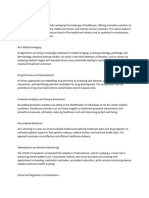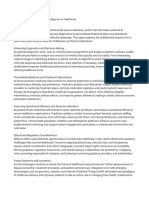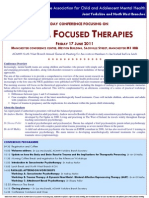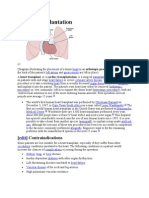The Impact of Artificial Intelligence On Modern Healthcare
The Impact of Artificial Intelligence On Modern Healthcare
Uploaded by
rahullal11122Copyright:
Available Formats
The Impact of Artificial Intelligence On Modern Healthcare
The Impact of Artificial Intelligence On Modern Healthcare
Uploaded by
rahullal11122Original Title
Copyright
Available Formats
Share this document
Did you find this document useful?
Is this content inappropriate?
Copyright:
Available Formats
The Impact of Artificial Intelligence On Modern Healthcare
The Impact of Artificial Intelligence On Modern Healthcare
Uploaded by
rahullal11122Copyright:
Available Formats
The Impact of Artificial Intelligence on Modern Healthcare
Artificial intelligence (AI) has revolutionized modern healthcare, bringing transformative
changes that enhance the quality, accessibility, and efficiency of medical services. One of the
most significant impacts of AI in healthcare is its ability to analyze vast amounts of data
quickly and accurately. Medical professionals can now leverage AI-powered tools to sift
through patient records, research papers, and clinical trial results to identify patterns and
insights that were previously impossible to detect. This has led to more accurate diagnoses,
personalized treatment plans, and early detection of diseases, ultimately improving patient
outcomes. For instance, AI algorithms are being used to detect cancerous cells in medical
imaging with greater precision than human radiologists, allowing for earlier and more
effective interventions. Moreover, AI's predictive capabilities enable healthcare providers to
anticipate potential health issues before they become critical, facilitating preventive care and
reducing the burden on healthcare systems.
Another profound impact of AI is in the realm of drug discovery and development.
Traditionally, developing new medications is a time-consuming and costly process, often
taking years and billions of dollars to bring a drug to market. AI accelerates this process by
analyzing biological data and predicting which compounds are most likely to succeed as new
treatments. This not only speeds up the development of new drugs but also reduces costs,
making innovative therapies more accessible to patients. Companies like DeepMind and IBM
Watson Health are at the forefront of using AI to identify promising drug candidates and
optimize clinical trials, significantly shortening the time frame from discovery to distribution.
AI is also enhancing patient care through the development of intelligent virtual assistants and
chatbots. These AI-driven tools provide patients with instant access to medical information,
answer health-related questions, and even help schedule appointments. For patients with
chronic conditions, AI-powered applications can monitor vital signs in real-time and alert
healthcare providers to any concerning changes, ensuring timely interventions. Additionally,
AI is being used to create personalized health and wellness plans, taking into account
individual preferences, genetic information, and lifestyle factors. This personalized approach
not only improves patient engagement but also encourages adherence to treatment regimens,
leading to better health outcomes.
Despite its many benefits, the integration of AI in healthcare also raises ethical and practical
concerns. Data privacy is a significant issue, as AI systems require access to vast amounts of
personal health information. Ensuring that this data is protected and used responsibly is
crucial to maintaining patient trust. Moreover, the reliance on AI must not overshadow the
importance of human judgment in medical decision-making. While AI can provide valuable
insights and recommendations, the final decisions should always rest with qualified
healthcare professionals who can consider the nuances and complexities of individual cases.
There is also the challenge of ensuring that AI technologies are equitably accessible, as
disparities in access could exacerbate existing healthcare inequalities.
In conclusion, AI is undeniably transforming healthcare by enhancing diagnostic accuracy,
accelerating drug discovery, and improving patient care. However, it is essential to address
the associated ethical and practical challenges to fully realize the potential of AI in creating a
more efficient, effective, and equitable healthcare system. As AI continues to evolve, its
integration into healthcare will likely become even more profound, paving the way for
innovative solutions that can tackle some of the most pressing health challenges of our time.
You might also like
- Patient Blepharitis LeafletDocument2 pagesPatient Blepharitis LeafletPrincess ErickaNo ratings yet
- Third Essay NewDocument2 pagesThird Essay Newlekox20481No ratings yet
- Exploring The Impact of Artificial Intelligence On Healthcare InnovationDocument3 pagesExploring The Impact of Artificial Intelligence On Healthcare InnovationChrisjan TorresNo ratings yet
- Title 1Document3 pagesTitle 1abde93620No ratings yet
- The Role of Artificial Intelligence in HealthcareDocument2 pagesThe Role of Artificial Intelligence in HealthcareClarisse TalanNo ratings yet
- The Impact of Artificial Intelligence On HealthcareDocument3 pagesThe Impact of Artificial Intelligence On HealthcareAsif AliNo ratings yet
- The Role of Artificial Intelligence in Transforming HealthcareDocument3 pagesThe Role of Artificial Intelligence in Transforming HealthcareazzxureNo ratings yet
- The Role of Artificial Intelligence in Revolutionizing HealthcareDocument2 pagesThe Role of Artificial Intelligence in Revolutionizing HealthcarealfizabrandustNo ratings yet
- AI in Healthcare EssayDocument3 pagesAI in Healthcare Essaydragonguy6622No ratings yet
- Essay 3Document2 pagesEssay 3Hardik Kashyap VepariNo ratings yet
- Of CourseDocument2 pagesOf Coursegoleta4404No ratings yet
- Slidesgo Transforming Healthcare The Impact of Artificial Intelligence 20240812151030gOP0Document12 pagesSlidesgo Transforming Healthcare The Impact of Artificial Intelligence 20240812151030gOP0Vighnesh PoteNo ratings yet
- Revolutionizing Healthcare: The Power of AIDocument8 pagesRevolutionizing Healthcare: The Power of AIKshitij OvhalNo ratings yet
- IntroductionDocument2 pagesIntroductionAlgo GCNo ratings yet
- The Impact of Artificial Intelligence On Modern HealthcareDocument3 pagesThe Impact of Artificial Intelligence On Modern HealthcareFerran MassoNo ratings yet
- Artificial Intelligence in HealthcareDocument2 pagesArtificial Intelligence in Healthcarenoble.tla.2023No ratings yet
- 2. The Role of Artificial Intelligence in HealthcareDocument2 pages2. The Role of Artificial Intelligence in Healthcare2023436542No ratings yet
- The Impact of Artificial Intelligence On Modern HealthcareDocument3 pagesThe Impact of Artificial Intelligence On Modern HealthcareceliadessardNo ratings yet
- Ai Tech in HealthcareDocument2 pagesAi Tech in Healthcaresvk782No ratings yet
- AI in HealthCareDocument10 pagesAI in HealthCareidonlyforhack101No ratings yet
- The Role of AI in HealthcareDocument2 pagesThe Role of AI in Healthcareabdelmajid.hamouti3No ratings yet
- The Role of Artificial Intelligence in HealthcareDocument2 pagesThe Role of Artificial Intelligence in HealthcarerkNo ratings yet
- AIDocument2 pagesAISebaa Mohammed RedaNo ratings yet
- AI_in_HealthcareDocument1 pageAI_in_Healthcarenavjyoth508No ratings yet
- The Role of Artificial Intelligence in Modern HealthcareDocument1 pageThe Role of Artificial Intelligence in Modern HealthcarejatroutenNo ratings yet
- 4 TitleDocument2 pages4 TitlebradhakemanNo ratings yet
- The Role of Artificial Intelligence in HealthcareDocument6 pagesThe Role of Artificial Intelligence in Healthcarekgnmk1997No ratings yet
- AI in Modern Healthcare ResearchDocument2 pagesAI in Modern Healthcare ResearchAmanda NoletoNo ratings yet
- Adi ResaerchDocument4 pagesAdi Resaerchsickboy.adiNo ratings yet
- AI and ML in Medicine Research PaperDocument2 pagesAI and ML in Medicine Research PaperJohn BrownNo ratings yet
- AI_in_Medical_Diagnosis_Updated (2)Document11 pagesAI_in_Medical_Diagnosis_Updated (2)bishnoir814No ratings yet
- The Impact of AI On HealthcareDocument6 pagesThe Impact of AI On HealthcareNur Ad-DujaNo ratings yet
- 65b4cb5145a33-Makalah Bahasa InggrisDocument2 pages65b4cb5145a33-Makalah Bahasa InggrisafnichaannnNo ratings yet
- Artificial IntelligenceDocument9 pagesArtificial IntelligenceLuna LovegoodNo ratings yet
- The Role of Artificial Intelligence in HealthcareDocument2 pagesThe Role of Artificial Intelligence in Healthcareiconline701No ratings yet
- The Revolutionary Role of Artificial Intelligence in Medical ScienceDocument2 pagesThe Revolutionary Role of Artificial Intelligence in Medical ScienceDipak VMNo ratings yet
- Artificial Intelligence Revolutionizing Healthcare - A Prescription For The FutureDocument2 pagesArtificial Intelligence Revolutionizing Healthcare - A Prescription For The FutureMaalav WhorraNo ratings yet
- slidesgo-revolutionizing-healthcare-the-future-of-ai-powered-diagnostics-20241006143748XY5JDocument14 pagesslidesgo-revolutionizing-healthcare-the-future-of-ai-powered-diagnostics-20241006143748XY5JMargad MunkhjargalNo ratings yet
- The Rise of Artificial Intelligence in HealthcareDocument5 pagesThe Rise of Artificial Intelligence in HealthcareJDC Just Dimension ConceptNo ratings yet
- The Impact of Artificial Intelligence on Modern HealthcareDocument2 pagesThe Impact of Artificial Intelligence on Modern Healthcarebananaman272003No ratings yet
- Articel 3Document2 pagesArticel 3Abiram RNo ratings yet
- Role of AI HEALTHCAREDocument1 pageRole of AI HEALTHCAREqicawedaNo ratings yet
- Artificial Intelligence in HealthcareDocument1 pageArtificial Intelligence in Healthcareahmed shaikNo ratings yet
- Document 1Document2 pagesDocument 1abermudezlazaroNo ratings yet
- Research Repor2Document4 pagesResearch Repor2vihaanmeraniNo ratings yet
- Module 3Document2 pagesModule 3Jay SoonNo ratings yet
- The Role of Artificial Intelligence in HealthcareDocument1 pageThe Role of Artificial Intelligence in Healthcarehimaspotify84No ratings yet
- 1Document2 pages1ldcNo ratings yet
- TPGDocument4 pagesTPGjonatanskulpe2021No ratings yet
- The Role of Artificial Intelligence in HealthcareDocument2 pagesThe Role of Artificial Intelligence in Healthcarearvinraghubar9No ratings yet
- AIDocument1 pageAIKayli AgrellaNo ratings yet
- Transforming Healthcare: The Role and Impact of Artificial IntelligenceFrom EverandTransforming Healthcare: The Role and Impact of Artificial IntelligenceNo ratings yet
- Text 2Document1 pageText 2Arnaud ChochoisNo ratings yet
- The impact of AI on healthcareDocument3 pagesThe impact of AI on healthcarewanjiku.wanja24No ratings yet
- AI in Healthcare - Revolutionizing Diagnosis and TreatmentDocument5 pagesAI in Healthcare - Revolutionizing Diagnosis and Treatmentjuliaevan3No ratings yet
- The Role of AI in HealthcareDocument1 pageThe Role of AI in Healthcarecoder.ritekNo ratings yet
- The Role of Artificial Intelligence in Modern HealthcareDocument4 pagesThe Role of Artificial Intelligence in Modern HealthcareFern Andrei RoselloNo ratings yet
- Artificial Intelligence in HealthcareDocument2 pagesArtificial Intelligence in Healthcareg acNo ratings yet
- AI in Healthcare ArticleDocument14 pagesAI in Healthcare Articlebrucewayne.07690No ratings yet
- Title - The Impact of Artificial Intelligence On HealthcareDocument2 pagesTitle - The Impact of Artificial Intelligence On HealthcareMastanNo ratings yet
- Blog ContentDocument6 pagesBlog ContentnatashaNo ratings yet
- Psikologi KodingDocument141 pagesPsikologi KodingAntonSusantoNo ratings yet
- Review Article: Bali Chouhan Et Al / Int. J. Res. Ayurveda Pharm. 4 (4), Jul - Aug 2013Document6 pagesReview Article: Bali Chouhan Et Al / Int. J. Res. Ayurveda Pharm. 4 (4), Jul - Aug 2013witchiewomanNo ratings yet
- Courtship, Dating and Marriage: Lesson 1Document21 pagesCourtship, Dating and Marriage: Lesson 1Kristine Joy Perez - CapiliNo ratings yet
- Transportation in Animals and Plants Worksheet 8 PDFDocument2 pagesTransportation in Animals and Plants Worksheet 8 PDFParul ShahNo ratings yet
- Pyoderma-NonPyoderma DR - Danny PDFDocument89 pagesPyoderma-NonPyoderma DR - Danny PDFPrayogaTantraNo ratings yet
- Unit 1 Touch2Document4 pagesUnit 1 Touch2SoniaNo ratings yet
- German CVDocument1 pageGerman CVdianamarcin335No ratings yet
- Trauma ConferenceDocument2 pagesTrauma ConferenceElaine Hanzak100% (1)
- Epi NotesDocument5 pagesEpi NoteshoneykrizelNo ratings yet
- Registar Za Akutni Koronarni Sindrom U Srbiji 2010Document127 pagesRegistar Za Akutni Koronarni Sindrom U Srbiji 2010Poledica MladenNo ratings yet
- 2016 NUR1021 Calculation of Basic IV Drip Rates - InstructorDocument39 pages2016 NUR1021 Calculation of Basic IV Drip Rates - InstructorMikhaelEarlSantosTacorda100% (2)
- Teen PregnancyDocument1 pageTeen PregnancyAlleli Faith LeyritanaNo ratings yet
- Heart TransplantationDocument4 pagesHeart TransplantationAncy AchankunjuNo ratings yet
- Pharmacovigilance Q1 Summary 20232024Document19 pagesPharmacovigilance Q1 Summary 20232024Dharmendra KumarNo ratings yet
- Obesity Treatment Recommendations in The Philippines:Perspective On Their Utility and Implementation in Clinical PracticeDocument8 pagesObesity Treatment Recommendations in The Philippines:Perspective On Their Utility and Implementation in Clinical PracticeKaye Rioflorido ChingNo ratings yet
- M4 BIO111 Assignment1Document5 pagesM4 BIO111 Assignment1Kyle DunnNo ratings yet
- Endoftalmus PDFDocument7 pagesEndoftalmus PDFArmayaniNo ratings yet
- Reference Ranges Pediatric Endocrin PDFDocument14 pagesReference Ranges Pediatric Endocrin PDFshoratanNo ratings yet
- Treating OsteoporosisDocument7 pagesTreating Osteoporosisdanny17phNo ratings yet
- Subtotal PetrosectomyDocument9 pagesSubtotal PetrosectomyKhzNo ratings yet
- PSGS - BSG 2013 CPG Early Breast CA Full TextDocument61 pagesPSGS - BSG 2013 CPG Early Breast CA Full Textaa628100% (1)
- KC Star Naloxone Harm Reduction Zine (Not Flipped)Document4 pagesKC Star Naloxone Harm Reduction Zine (Not Flipped)The Kansas City Star100% (1)
- Microbiology Exam (Answers) 2Document118 pagesMicrobiology Exam (Answers) 2Soz P. KawaniNo ratings yet
- Ikobho Surgical NutritionDocument59 pagesIkobho Surgical NutritionPrincewill SeiyefaNo ratings yet
- 19-26 Faktor Risiko Kejadian Hipertensi Pada Wanita Usia Subur Di Wilayah Kerja Puskemas NaibonatDocument8 pages19-26 Faktor Risiko Kejadian Hipertensi Pada Wanita Usia Subur Di Wilayah Kerja Puskemas Naibonatlidya inaNo ratings yet
- MICRO BIOLOGY ConjunctivitisDocument5 pagesMICRO BIOLOGY Conjunctivitisbabyko143444No ratings yet
- Blue and Dark Blue Psychiatrist Medical ResumeDocument4 pagesBlue and Dark Blue Psychiatrist Medical ResumeHeba ElkharboutlyNo ratings yet
- Cell InjuryDocument4 pagesCell InjurySadam IrshadNo ratings yet
- Complications of Labor and BirthDocument54 pagesComplications of Labor and BirthIconMaicoNo ratings yet

























































































